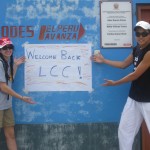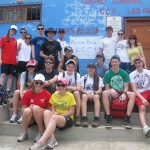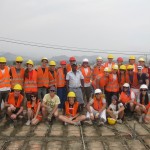During the March break I attended two alumni receptions in the UK: one in London with LCC grads ranging from 1943 to 2007, and another with a group alumni from the Class of ‘57, celebrating their 55th reunion at one of our graduates’ homes in the town of Canterbury. Although now in their 70s, each LCC grad was sure to remind me that they are still proudly grounded in the experiences, foundations and traditions they shared while at LCC.
Before the reunions I took the opportunity to accept an invitation to visit Gordonstoun School in the north of Scotland; a school founded in the mid 1930s by Mr. Kurt Hahn, the educator whose ideas led to the creation of the Round Square international association of schools—today about 100 schools strong. We have now been a member of this organization for five years.
Round Square has the following mission:
“To empower students to become the leaders and guardians of tomorrow’s world.”
Kurt Hahn stated: “Education must enable young people to effect what they have recognized to be right, despite hardships, despite dangers, despite inner skepticism, despite mockery from the world…”
In thinking about the establishment of the Round Square as a global association of schools—which occurred in the mid 1960s—knowing Hahn’s background as a man and educator is important.
Hahn was different than traditional educators of his era. Like most, he did believe in the importance of hard work and skill development in the classroom. However, in some ways he was radically different than other independent school principals. He saw the greatest challenge for schools as existing outside of the traditional classroom. He stressed the importance of developing students’ moral character and leadership skills, as well as developing personal conviction and courage. Interestingly, he himself displayed an extraordinary amount of courage, which is directly linked to the founding of Gordonstoun in 1934.
Hahn was a German Jew whose first school was Salem, a school in Germany, which opened its doors immediately after WWI in 1920. In January 1933, Adolph Hitler came to power with openly racist policies and violent visions of territorial expansion across Europe.
As Hitler and the Nazi party gained influence and public support, Hahn found himself increasingly philosophically opposed to the German fascist regime, particularly after five Nazi soldiers trampled a young Communist to death while his mother looked on. What’s striking is that after Hitler came out in support of the soldiers, Hahn reacted by sending a public letter to all Salem school alumni saying:
“This is a crisis that goes beyond politics. Germany is at stake, her Christian civilization, her good name, her soldiers’ honour. Salem cannot remain neutral. I ask the members of the Salem (Alumni) Union who are active in the S. A. or S. S. to break with Salem or break with Hitler.”
“It was,” said a British teacher who was teaching at Salem at the time, “the bravest deed in cold blood that I have witnessed.”
Not surprisingly, Hahn became a marked man. In a series of mass arrests one month after Hitler came to power, Hahn was jailed in February 1933. The shock waves swiftly reached Britain where his friends took up his cause. When British Prime Minister Ramsay MacDonald made official representation, Hahn was release and in July 1933 he left Germany for England as a political refugee.
Unable to return to his German homeland, the following year, 1934, Kurt Hahn established Gordonstoun School near the blustery North Sea coast of Scotland.
Hahn made it his life’s mission to promote peace through education, remaining as headmaster at Gordonstoun until 1954. From 1920 until 1954, Hahn focused on the importance of service learning, outdoor education and experiential/adventure education, founding the Outward Bound Movement in 1941—itself largely a response to a war dilemma (low survival rate of British merchant seaman in the Battle of the Atlantic).
Hahn was not idle in retirement. In 1962, at the age of 76, Hahn established The Atlantic College in Wales. The Atlantic College was the first of 10 United World Colleges—still a popular group of schools designed to bridge the international gap between secondary education and university level study by offering a universally recognized degree—the IB International Baccalaureate. The students at these colleges come from many different countries and the educational program stressed the importance of outdoor activities and of service to the community. One of the World Colleges is located in Canada (Pearson College in British Columbia).
Wrote British Admiral D. J. Hoare:
It was always Hahn’s view that education was a means of reducing national barriers and fostering international cooperation. When two people of action meet and find themselves of common mind, things happen…The United World College has a distinctively Hahnian component, referred to as its “humanitarian curriculum.”
Clearly, Kurt Hahn had an outstanding career. After 13 years at Salem he stood tall against Hitler and the Nazis and established service, adventure and international education as important pillars during 20+ years at Gordonstoun in Scotland.
So back to my visit to the UK in March. It was impressive to see the old buildings on the Gordonstoun campus and to consider the inclusion of rescue skills as part of that school’s curriculum at sea, and firefighting and disaster relief training on land. I reflected on the courage required by Hahn to challenge Hitler.
I believe we need to put the Hahn’s educational theories into a modern context. This begs the following questions for LCC students:
- Have you integrated service in some meaningful way into your life?
- Are you finding a way to engage with the principle challenges of our times, locally and internationally?
- Are you proactive in seeking outdoor opportunities in the natural world, and thus have you gained an appreciation for the importance and fragility of our natural environment and the global ecosystem?
Hahn wanted all young people in independent schools to throw off “the shackles of their privilege” and develop tenacity, fitness, enterprise and compassion. I invite you to consider if you are trying to explore developing these important qualities.
We have ample opportunities at LCC. Challenge yourself and through experience you will likely surprise yourself with your own potential and what lies dormant within you now. Like Hahn, I urge you to have the courage to act. – Chris Shannon, Headmaster




